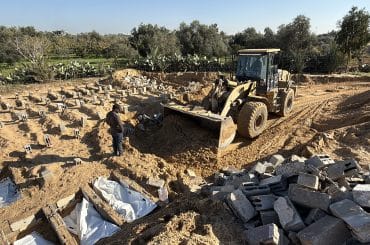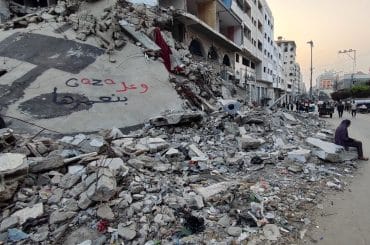The editors of this site are grief stricken today. We learned last night that our friend Matthew Phillips, a hugely-gifted young writer who contributed to us often, died Monday April 4 in New York. Our hearts go out to Matt’s parents and family and friends.
As readers of this site know, Matt was an incredibly mature young writer. He had a laser mind, great imagination, and a wide-ranging appetite for books, but it was his moral commitment that bound those talents into memorable pieces of writing. He had attended graduate school and worked as a bartender, but saw both those activities as getting in the way of his chief goal, leading a life of the mind.
We were humbled to run Matt’s stuff. We always learned from his pieces, and we always told him it was just a matter of time before he would be writing for much bigger and more prestigious places. Sadly, that wasn’t in store for Matt, and the fact that he told his parents this site was important to him is one of the only good feelings we can have on this awful day.
We’ll have more to say about Matt’s life and death soon. In the meantime, it seemed fitting to link to a couple of recent pieces he did here and excerpt a few paragraphs. We’ll run more of Matt’s writing in days to come.
Here is a lightning strike from two months back on the New York Times Magazine’s prescription for peace in Israel/Palestine that begins in an elegant and inarguable manner:
What is it about the Israeli/Palestinian conflict that compels intelligent and sensitive analysts to persist in believing—despite overwhelming evidence to the contrary— that a solution will emerge top-down, from leaders, rather than from demands made by civil society?
Here is a devastating piece that Matt wrote in January on Michael Walzer’s Just War Theory that ends with these ringing phrases:
Walzer’s distinction between “illegal but morally necessary wars” is an ideological recipe for wars that are neither legal nor moral. Yet one quality just war theory undoubtedly has, and that international law admittedly lacks, is that it allows intellectuals to rationalize the actions of a favorite state, and, in turn, assuage the tribulations of their conscience.
And here is an excerpt from Matt’s piece on Breaking the Silence testimonies about the occupation that shows his literary range, going from Orwell to Babel, and not pretentiously either. Matt used those great writers as touchstones to understand the outrages of the occupation.
The writer consistently evoked by a reading of the Testimonies is Orwell; one wishes his Jewish incarnation were alive in Israel today to write an essay called “Politics and the Hebrew Language”. Describing his experiences harassing children, and deliberately making them cry, a soldier tells an interviewer about his “work with the people.” “‘Working with the people’ is a nice turn of phrase”, the interviewer replies. Another soldier in Hebron explains the practice of “Mapping”: “Mapping is when you get an address from above, I don’t know why, and you like go, go from house to house. You enter a house, you take IDs. I remember that you do searches in the room afterwards, and then one of the senior guys came, dumped out the closet, so you also dump out the closet…then you dump-dump-dump and then leave, you move to the next house.” The interviewer asks, sarcastically, “What are you looking for? It sounds very organized”. “When I was a soldier I didn’t understand what it was”, the soldier replies. These reflections fall under the third section of the Testimonies, called “Administering Palestinians Civilian Life—‘Fabric of Life’”. As the editors of the report explain, “Israel’s official spokespeople argue that Israel does not withhold basic life essentials from Palestinians or engender a humanitarian crisis, but does, despite its security needs, allow for a Palestinian ‘fabric of life’ in the Territories.” As Orwell noted, “political language has to consist largely of euphemism, question-begging and sheer cloudy vagueness.” The writers from Breaking The Silence explain: “The Israeli military forces make use of code-words like ‘fabric of life’ and ‘proportionality’ to describe and characterize different sorts of assignments: checkpoints, house and infrastructure demolitions, forced entry into Palestinian houses, and even targeted assassinations. The soldiers’ testimonies in this chapter give a more accurate account of the Palestinian “fabric of life” under Israeli Occupation: arbitrary, temporary, and empty of dignity.”
Then there are those chickens. They seem destined to emerge as a symbol, in any given report on Israeli atrocities, of the forces at work against the Palestinians. In the Goldstone Report, the wanton destruction of the farms mirrors the wholesale destruction of Gaza: the chickens, allowed to roam outside before their death, not unlike a population under placed under siege and then bombarded. In the Testimonies, we are privy not to the massive and concentrated use of force, but the everyday cruelties of an occupation, the steady takeover of people’s lives. In Jenin, in 2002, a solider in the “Nahal Brigade” describes “veteran soldiers” locking the owner of a house in a room. The soldiers “wanted to cook a meal so they slaughtered some of his chickens and barbecued them downstairs. Yeah, this is what they did, I remember them coming back happy after their meal…Yeah, they did what they fucking wanted.”
Here, a different writer in conjured up. In his celebrated “Red Cavalry Stories”, the early-twentieth century Russian writer Isaac Babel describes the experience of a Jew serving alongside Cossacks after the Revolution. One of his more famous stories, “My First Goose”, is about a Jewish soldier slaughtering a goose, then demanding that a peasant woman roast it for him, in order to impress those in his regiment. Some Israeli soldiers, as we have seen, are apparently confident enough to do the cooking themselves; but the Testimonies are filled with similar examples of young boys trying to impress each other, living up to some obscene definition of “manhood”, with predictable results. One solider recalls throwing a stun grenade inside a middle of a market. “The commanders say: ‘Throw as hard as you can in the center.’ I threw in the center, it hit a chicken coop. The stun grenade hit the coop and killed the chickens, I don’t know. There were tons of yells and screams and then the rocks started and that was it, it deteriorated.”

